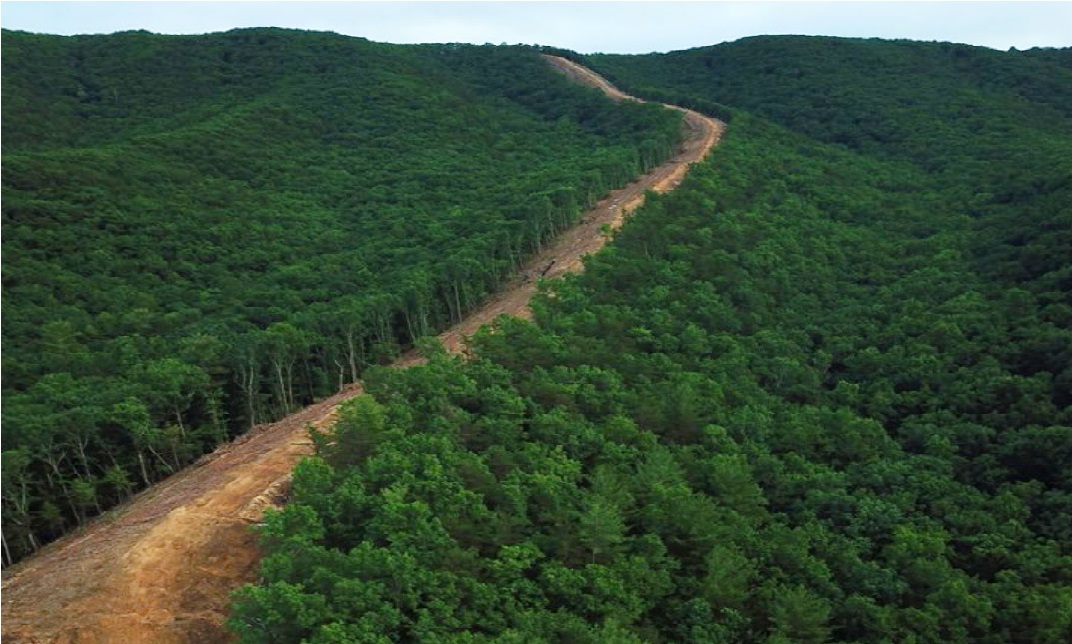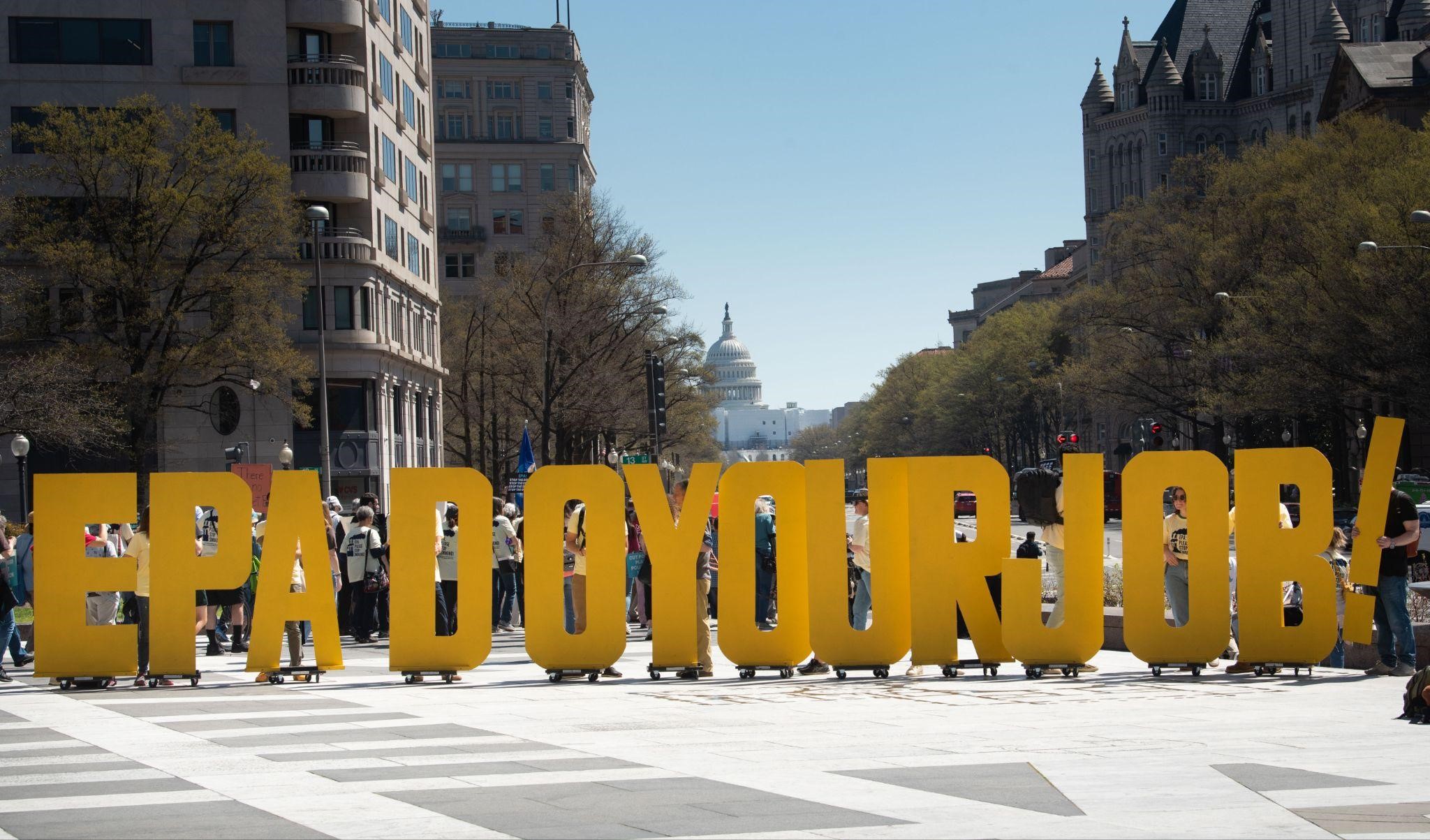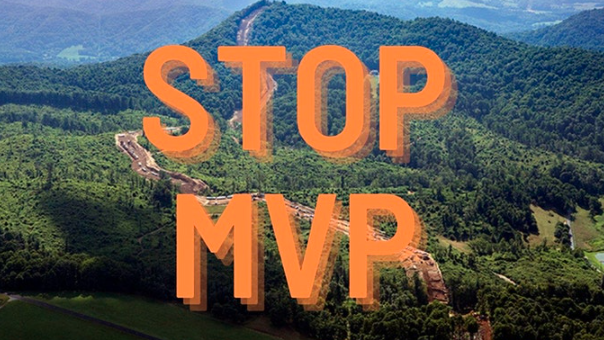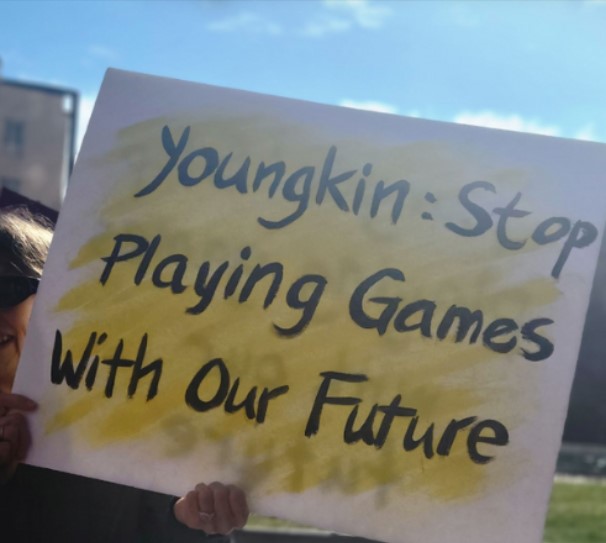Today, the Environmental Protection Agency (EPA) announced a proposal to tighten restrictions on greenhouse gas emissions from fossil-fuel power plants. EPA proposed two new rules: one for existing coal and gas plants, and one for new gas plants. The largest facilities must make the earliest and most substantial carbon emission cuts, while retiring coal plants and peak-demand gas units face more lenient standards. New gas plants must implement the latest emission reduction technologies within a specific timeframe.
Continue readingDominion Energy and Governor Youngkin unite behind corporate profit grab that would bankrupt Virginians and exacerbate climate change
Richmond, VA — Yesterday, Dominion Energy published its latest Integrated Resource Plan (IRP), which outlines a series of methods to meet energy demand in its territory. Dominion recommends making unprecedented capital expenditures that it will pass on directly to customers. Included in the IRP is a push for small modular reactors (SMRs), a new nuclear reactor prototype that costs up to $10 billion each at a nameplate capacity of 300 megawatts of electricity and is currently operational only on one floating barge in Russia. A solar facility costs 3% as much per megawatt of nameplate capacity.
The IRP also imagines eliminating mandatory retirements of coal-fired power plants – a signature piece of Virginia’s plan to move to 100% clean energy – and expanding the use of gas-fired plants. Many case scenarios suggest Dominion abandon the clean energy goals outlined in the 2020 Virginia Clean Economy Act. All iterations of the IRP assume that Virginia will exit the Regional Greenhouse Gas Initiative by 2024, despite a lack of legal authority for Virginia to do so without the approval of the legislature.
The changes outlined in Dominion’s IRP would contribute directly to global warming and force Virginia to give up its position as a national leader on climate. Reckless capital expenditures on unproven energy technology and rolling back of climate progress are also key provisions of Governor Glenn Youngkin’s 2022 Energy Plan. He issued a laudatory press release late Monday night, raising the specter of a dangerous new alliance between Dominion and the Governor, who sparred over utility regulation this past legislation session.
Victoria Higgins, the Virginia Director for CCAN, stated:
“We should recognize this unholy union between multi-millionaire Governor Youngkin and Dominion for what it is: a corporate profit grab that would bankrupt Virginians and exacerbate climate change. The state can meet demand without compromising our clean energy goals or forcing Virginians to choose between energy and food. Suggesting new fracked gas infrastructure in 2023 is patently absurd.”
Dominion Energy, a regulated monopoly, is responsible for its own energy planning and has historically steered towards large capital expenditures that provide the company maximum profit. As of February 2023, Virginians rank 8th in the country for highest energy bills.
Contact:
Victoria Higgins, 201-937-7017, vhiggins@chesapeakeclimate.org
KC Chartrand, 240-620-7144, kc@chesapeakeclimate.org
# # #
The Chesapeake Climate Action Network is the oldest and largest grassroots organization dedicated exclusively to raising awareness about the impacts and solutions associated with global warming in the Chesapeake Bay region. For more than 20 years, CCAN has been at the center of the fight for clean energy and wise climate policy in Maryland, Virginia, and Washington, D.C.
U.S. Forest Service lets Mountain Valley Pipeline rip through Jefferson National Forest – CCAN protests
Richmond, VA — Today, the U.S. Forest Service published its Final Supplemental Environmental Impact Statement (FSEIS) for the controversial Mountain Valley Pipeline (MVP), a proposed 303-mile fracked gas pipeline through Virginia and West Virginia that would contribute the equivalent of 26 coal plants’ worth of carbon emissions. The FSEIS allows MVP to cross 3.5 pristine miles of the Jefferson National Forest and represents the company’s third attempt to receive approval for the controversial crossing. MVP suffered another blow last week when a crucial water permit for construction in West Virginia was thrown out.
Outcry from impacted communities in Appalachia has been immense. Chesapeake Climate Action Network (CCAN) supporters submitted more than 4,000 comments over the last year in opposition to the pipeline during comment periods for numerous permits, including several hundred during the Forest Service comment period. Moreover, construction of large, new fossil fuel projects is incompatible with both national climate goals and global commitments, including President Joe Biden’s pledge to reduce emissions by over 50% by 2030.
Anne Havemann, the General Counsel for CCAN, stated:
“We are gravely disappointed in the Forest Service’s decision to allow the Mountain Valley Pipeline to rip through the cherished Jefferson National Forest. With this decision, the Forest Service is not fulfilling its mission to ‘sustain the health of the nation’s forests’ so as to ‘meet the needs of present and future generations.’ Present and future generations need a pristine environment and a stable climate, not a fracked-gas pipeline that destroys forests, pollutes waterways, and exacerbates global warming. CCAN is committed to ensuring that no gas ever flows through the Mountain Valley Pipeline.”
In the last several weeks, MVP has had permits both vacated and issued by the Fourth Circuit Court of Appeals. Industry analysts are now skeptical of a 2023 in-service date. Federal “permitting reform” to speed fossil fuel project approval is stagnant, and new legal challenges have been mounted against MVP’s recently reissued Biological Opinion by CCAN and partners.
Contact:
Anne Havemann, 240-630-2146, anne@chesapeakeclimate.org
KC Chartrand, 240-620-7144, kc@chesapeakeclimate.org
# # #
Environmental and Justice Groups March on Biden’s EPA, Demanding an End to Delays on Power Plant Rules
“EPA: Please Stop Smoking!” rally demands that the agency break its bad habit of missing industry pollution rule deadlines, endangering our health and climate.
LIVESTREAM HERE (Photos Below)
WASHINGTON, D.C. – Today, for the first time under the Biden Administration, over 150 environmental and justice advocates protested loudly outside the office of the Environmental Protection Agency (EPA) in Washington, D.C. to demand faster action on clean-up of deadly fossil fuel power plants. A broad coalition of environmental and justice speakers insisted that EPA quit delaying rules to curb harmful pollution that kills thousands of Americans every year. They said that the EPA has recently taken steps in the right direction, proving that progress is possible, but now the agency needs to move faster and further.
Recent media reports – and this groundbreaking new report from Evergreen Collaborative – confirm that the EPA has missed key deadlines on carbon emissions and other power plant pollutants. EPA has made important progress recently by releasing its Good Neighbor Plan to cut smog and approving the California Clean Trucks Rule to set the pace for nationwide vehicle pollution standards, as well as being poised to publicly release a stronger mercury and air toxics standard proposal in the next few days. Yet, EPA is still lagging behind badly on other critical power plant rules that address a range of issues from carbon pollution and coal ash to implementation of cumulative impact analysis in permitting.
“For the sake of good health, justice, and the climate, we need action NOW from the EPA,” said
Quentin Scott, Federal Policy Director of the Chesapeake Climate Action Network (CCAN), the group that took the lead in organizing the rally. ”Any further delays by the agency will put lives in danger and create the risk of a future hostile administration arriving in time to reverse everything. We’re gratified that EPA has been listening over the past few months, since we started this campaign. We’re here today with our allies to urge the EPA to build on recent momentum and break the bad habit of delaying industry pollution rules.”
See a complete list of the protesters’ demands.
Dr. Lois Wessel, Alliance of Nurses for Healthy Environments, said: “Over 100,000 Americans die of air pollution every year. EPA’s habit of delaying rules for dirty-energy power plants means that those plants are continuing business as usual – so people are getting sick, especially in poor communities, and the planet keeps warming. EPA was scheduled to release their carbon pollution rules in June 2022 and then in March 2023 but they punted both times. Now the EPA needs to fulfill that promise and issue those rules before the end of April. Our lungs and planet can’t wait!”
Russell Armstrong, Climate Policy Director, Hip Hop Caucus, said: “The EPA has a legal and moral responsibility to ensure our air and water is clean, which requires protecting frontline communities from the adverse health impacts and toxic pollution from coal and gas plants. The Biden administration claimed to make environmental justice and climate action top priorities yet has repeatedly failed to deliver on its own self-imposed deadlines. EPA finalizing these power plant rules is a vital step in fulfilling campaign promises to help vulnerable Americans and set our nation on the path to a cleaner, greener, and more equitable future.”
Over a dozen groups joined CCAN as cosponsors of this protest action including: Alliance of Nurses for Healthy Environments, Center for Biological Diversity, Environmental Integrity Project, Food & Water Watch, Green New Deal for DC, Hip Hop Caucus, Interfaith Power & Light, Labor Network for Sustainability, Loudoun Climate Project, Physicians for Social Responsibility, Piedmont Environmental Council, Rachel Carson Council, Third Act, and 350.org Montgomery County.
If you would like to interview one of today’s speakers for additional comments, please contact KC Chartrand at kc@chesapeakeclimate.org or 240-620-7144.
Below are photos from the event, including speakers, banners, and more.

EPA Do Your Job! – Freedom Plaza
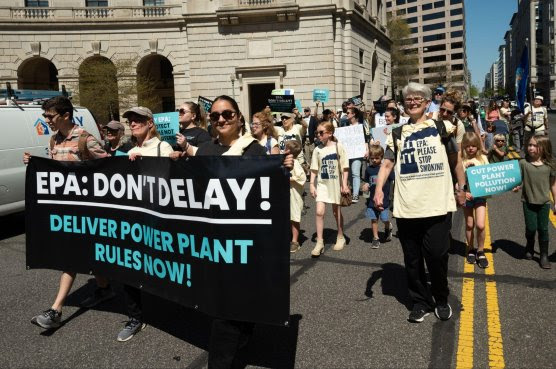
Marching on Pennsylvania Avenue
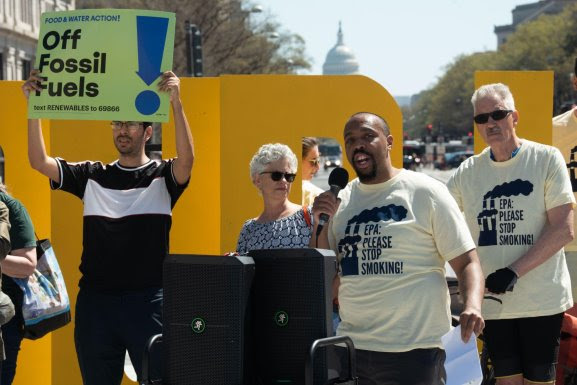
Quentin Scott, Federal Policy Director of CCAN
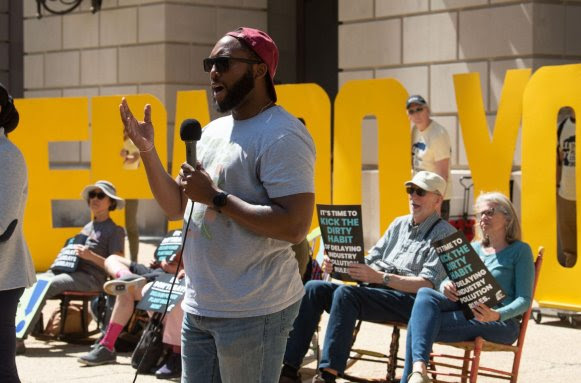
Russell Armstrong, Climate Policy Director, Hip Hop Caucus
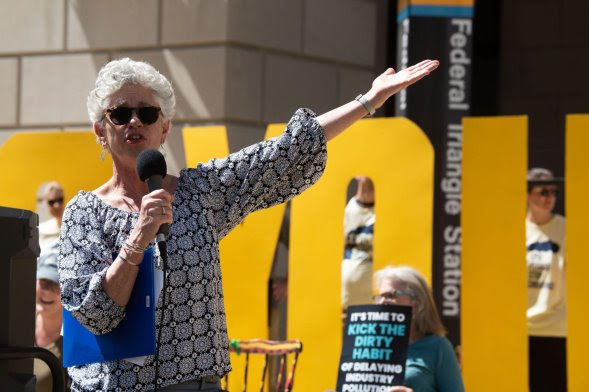
Dr. Lois Wessel, Alliance of Nurses for Healthy Environments
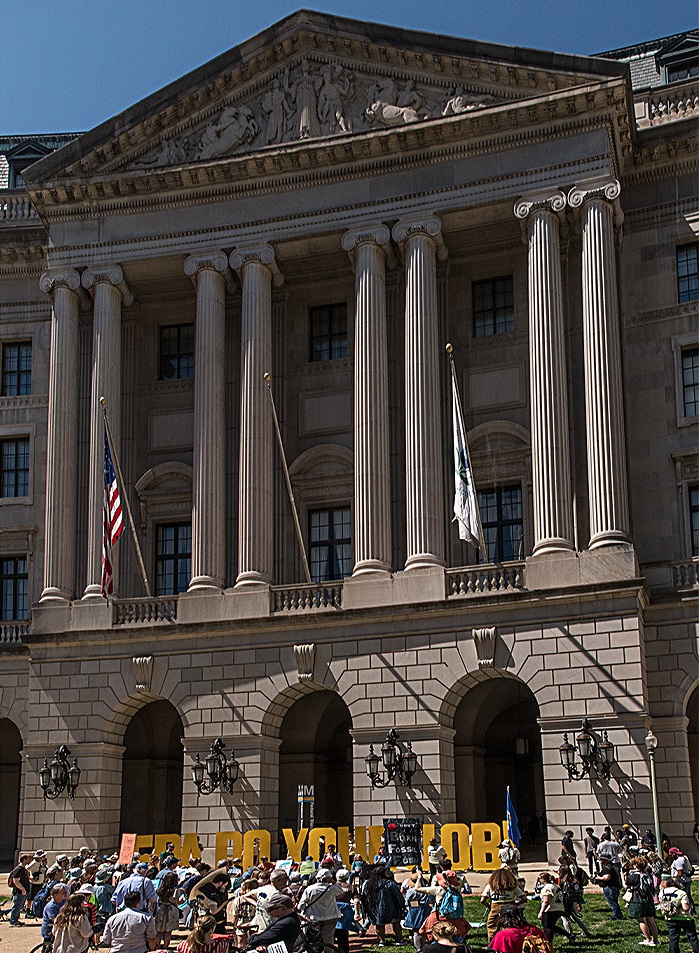
Bringing Our Message to EPA Headquarters
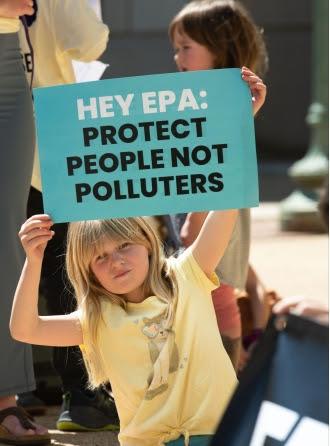
# # #
Chesapeake Climate Action Network is the first grassroots organization dedicated exclusively to raising awareness about the impacts and solutions associated with global warming in the Chesapeake Bay region. Founded in 2002, CCAN has been at the center of the fight for clean energy and wise climate policy in Maryland, Virginia, West Virginia, and Washington, DC.
CCAN condemns Mountain Valley Pipeline permit news
US Fourth Circuit Court of Appeals upholds Mountain Valley Pipeline water permit; CCAN objects
Richmond, VA — On March 29, the Fourth Circuit Court of Appeals ruled to uphold the Clean Water Act 401 permit for the Mountain Valley Pipeline (MVP). The Court found the DEQ’s granting of this critical stream-crossing permit “was neither arbitrary nor capricious.”
The Clean Water Act 401 permit addresses water crossings in the state of Virginia. This permit would allow for both trenchless and boring construction under protected waterways. The MVP is currently facing legal challenges to the 401 permit in West Virginia. Additionally, it lacks the Clean Water Act 404 permit – the federal companion permit issued by the Army Corps of Engineers.
The Mountain Valley Pipeline is a 303-mile fracked gas pipeline running through West Virginia and western Virginia. If completed, it would account for the carbon equivalent of 26 new coal fired power plants annually. The pipeline has been the subject of national debate with Sen. Joe Manchin’s attempts to push the project through Congress by limiting oversight and relaxing regulations. MVP LLC is additionally seeking a new permit to cross the Jefferson National Forest. Lacking these permits, the MVP cannot begin any construction.
Elle De La Cancela, the Virginia Campaign Coordinator for CCAN, stated:
“We are disappointed in the court’s ruling today. Time and time again, the MVP has shown that it has been unable to maintain water quality standards in the Commonwealth. We fear the impending impact on wildlife and the climate if construction were resumed.”
With a formal application in 2015, the Mountain Valley Pipeline was scheduled to be completed in 2018. It is now years past its deadline and $6 billion over budget, due to mounting concerns on construction and legal challenges. Prior cases over water quality violations resulted in millions paid to the Virginia Department of Environmental Quality and the West Virginia Department of Environmental Protection.
Contact:
Victoria Higgins, 201-937-7017, vhiggins@chesapeakeclimate.org
KC Chartrand, kc@chesapeakeclimate.org, 240-620-7144
# # #
The Chesapeake Climate Action Network is the oldest and largest grassroots organization dedicated exclusively to raising awareness about the impacts and solutions associated with global warming in the Chesapeake Bay region. For 20 years, CCAN has been at the center of the fight for clean energy and wise climate policy in Maryland, Virginia, West Virginia, and Washington, D.C.
Thousands Call on Air Pollution Board to Keep Virginia in RGGI
Regional Greenhouse Gas Initiative is widely supported by Virginians and law in the General Assembly – but Youngkin’s Air Board persists with its plan to pull out.
Richmond, VA – Thousands of Virginia residents have spoken up to keep Virginia in the Regional Greenhouse Gas Initiative (RGGI), opposing Governor Glenn Youngkin’s efforts to remove Virginia from this highly popular and successful climate program.
As of 9:08 AM on March 31, the final day for public comments on the Virginia Air Pollution Board’s proposal for withdrawal, more than 6,000 Virginians had submitted comments, with an overwhelming 87% majority in favor of RGGI. During the previous Notice of Intended Regulatory Action (NOIRA) public comment period, about 95% of comments – surpassing 750 in total – expressed opposition to the proposed repeal and in support of ongoing participation in RGGI. This shows that a consistently vast majority of Virginians have spoken out in favor of keeping the state in RGGI during each round of public comments.
Virginia joined RGGI by law through HB 981, the Clean Energy and Community Flood Preparedness Act, which requires Virginia to participate in the allowance auction process through RGGI. This year, 61 legislators affirmed that HB 981 requires Virginia to participate in RGGI, and that removal via the air board is “improper and illegal.”
Victoria Higgins, Virginia Director at the Chesapeake Climate Action Network, stated: “The proposed action by the air board offends our democratic norms and the rule of law, bypassing the will of the people and their chosen representatives in the General Assembly. HB 981 is not a vague directive for state agencies to administer RGGI when and as they see fit. It is a mandate.”
Students, elected officials, and citizen advocacy groups from all walks of life have spoken out in support of RGGI, a regional carbon market that sets a cap on overall carbon emissions from power plants and provides funding for climate-vulnerable neighborhoods. It sends money to coastal communities to protect themselves from floods and to low-income Virginians for energy efficiency upgrades to their homes. This program also helps clean up air pollution and drives economic growth, bringing more than half a billion dollars to the Commonwealth in its first year.
“The importance of Virginia’s participation in RGGI cannot be overstated,” said Sen. Lynwood Lewis, D-Accomack, who carried the 2020 legislation allowing Virginia’s participation. “It is by and large the most consequential piece of legislation I sponsored during my two decades in the Virginia legislature… Not only is the legal authority of the Governor to remove Virginia from RGGI in question, but to do so would put the future of our flood-prone and environmentally vulnerable communities in serious jeopardy.”
Grace Holderman, student at Brown College, said in a public comment: “As a Virginia college student, RGGI impacts me personally because it helps protect the future of my generation and generations to come. RGGI has already reduced greenhouse gas emissions in Virginia and other states, so repealing it would put us back on track to endanger the health and future of all people, especially young people like me and those in vulnerable communities.”
Daniel Walden, medical student and representative of Virginia Clinicians for Climate Action, wrote in a comment: “Since Virginia joined RGGI in 2021, it has helped thousands of us avoid health problems. Data from other RGGI states indicate that, over five years, improved air quality saved residents of those states from over 6,000 asthma attacks, over 100 preterm births, and, potentially, over 500 deaths. Those same benefits now apply to Virginians. Those arguing against RGGI say it’s too expensive for taxpayers. But sickness costs taxpayers, too. The EPA has estimated that improving air quality results in public health benefits that exceed the costs by over 30 times. Put simply, for every dollar we put into RGGI and programs like it, we taxpayers save $30 down the line–and we are healthier for it, too.”
There has been an immense outpouring of support for RGGI around the state. Concerned residents have marched, rallied, lobbied, and called their officials. A recent poll found that overwhelming, bipartisan majorities of Virginians—including a plurality of Republicans—want to stay in RGGI. Yet four appointees on the Virginia Air Pollution Control Board – all hand-picked by Gov. Youngkin – voted to remove the Commonwealth from RGGI.
Already, RGGI has:
- Lowered emissions. Since RGGI was founded, emissions from power plants in RGGI states have dropped by 50%, double the amount that emissions have dropped in non-RGGI states.
- Improved public health. Even just in its initial 5 years, over 8000 asthma attacks were avoided.
- Provided money to Virginians:
- Over $265 million to the Community Flood Preparedness Fund – VA’s only source of proactive flood prevention.
- Over $294 million to fund energy efficiency retrofits for low and moderate income homes and new, energy efficient affordable housing.
The Virginia legislature had the opportunity to change the law during the 2023 General Session, but one bill was introduced that would do so, which was swiftly voted down in committee. Despite this, the Board is expected to continue ignoring the will of the people and Virginia’s elected representatives and continue with this unpopular, unlawful move.
“Members of the Air Board are not intended to be political pawns at the whim of the Governor,” Higgins continued. “This action is expressly political in nature, being carried out solely based on campaign promises made by the Governor. It violates the duties and distorts the character of the Air Board. It is a dangerous precedent to set that should alarm all parties invested in the existence of nonpartisan Citizen Boards which fairly administer the regulations of the Commonwealth.”
Learn more about RGGI and its importance to Virginia.
The Chesapeake Climate Action Network is the oldest and largest grassroots organization dedicated exclusively to raising awareness about the impacts and solutions associated with global warming in the Chesapeake Bay region. For 20 years, CCAN has been at the center of the fight for clean energy and wise climate policy in Maryland, West Virginia, Virginia, and Washington, DC. Learn more: www.chesapeakeclimate.org
US Fish & Wildlife Reissues Controversial Permit for Struggling Mountain Valley Pipeline – CCAN Objects
The MVP still lacks several permits necessary to finish the project. CCAN joins groups in seeking to block construction until ALL challenges are resolved.
RICHMOND, VA. Yesterday, the U.S. Fish and Wildlife Service (USFWS) reissued a Biological Opinion detailing the expected and potential impacts on wildlife from the Mountain Valley Pipeline (MVP). The previously issued Biological Opinion was vacated by the U.S. Court of Appeals for the Fourth Circuit last year, concluding that the MVP’s environmental assessment did not adequately protect endangered species like the Roanoke logperch and the candy darter. In yesterday’s announcement, USFWS said that MVP has addressed those concerns and therefore reissued the document, removing one of several permitting barriers that must be resolved before the project can be completed.
However, USFWS noted that petitioners in Fourth Circuit litigation had submitted “voluminous materials” to the Service as they were in the process of finalizing this Opinion and those materials were not addressed. USFWS said that the Federal Energy Regulatory Commission and other agencies will need to assess whether those materials contain new information that might prevent them from relying on this Opinion to meet their obligations.
The Mountain Valley Pipeline is a 303-mile fracked gas pipeline running through West Virginia and western Virginia, majority-owned by Equitrans Midstream Corporation. If completed, it would account for the carbon equivalent of 26 new coal-fired power plants annually. The MVP is still waiting on verdicts from both the DC and the Fourth Circuit Court of Appeals and requires a Clean Water Act 404 from the U.S. Army Corps of Engineers. In addition, the MVP is seeking a renewed permit to cross the cherished Jefferson National Forest after two prior issuances were struck down by courts.
Chesapeake Climate Action Network and other environmental groups are objecting to the new permit and seeking to block any construction until all permits are acquired and unchallenged.
Statement from Elle De La Cancela, CCAN’s Central Virginia Campaign Coordinator:
“The Mountain Valley Pipeline still has much to answer for and a long way to go until the project is completed. The company’s exorbitant track record of vacated permits and water quality violations should signal that the MVP is incapable of abiding by the law. Coupled with our national and necessary shift to clean energy, I’m questioning — and I imagine investors are, too — how much money the MVP is willing to waste for a project that is billions of dollars over budget and totally out of step with national climate goals.”
In documents submitted to regulators, Equitrans expressed trepidation on a firm completion date. The company said that they were uncertain of returning the expected returns to joint partners. The Mountain Valley Pipeline is currently several years over timeline and $6 billion over budget.
Contact:
Elle De La Cancela, Central VA Campaign Coordinator, elle@chesapeakeclimate.org, 804-723-0441
KC Chartrand, Communications Director, kc@chesapeakeclimate.org, 240-620-7144
# # #
New Report: Major Offshore Wind Development Will Save Marylanders Money with Economic, Environmental, and Health Benefits
Offshore wind prices could fall to half the cost of current electricity prices by 2031, under best case scenario
Continue readingYoungkin Uses State Air Board to Illegally Repeal Popular Climate Policy
Proposed regulation would pull Virginia out of the Regional Greenhouse Gas Initiative, which was enacted by the legislature, delivers hundreds of millions of dollars to the state, and has overwhelming public support.
RICHMOND, VA- Today, the State Air Pollution Control Board, at Governor Glenn Youngkin’s behest, voted to remove Virginia from the Regional Greenhouse Gas Initiative (RGGI). RGGI is an overwhelmingly popular climate policy that produces hundreds of millions of dollars per year for flood resilience, affordable housing, and energy efficiency in the Commonwealth as well as reducing greenhouse gas emissions. The Air Board, stacked with Youngkin appointees and boasting numerous fossil fuel connections, voted to repeal RGGI despite that 95% of comments provided during a public comment period were in support of the policy.
Statement from Victoria Higgins, Virginia Director for Chesapeake Climate Action Network:
“Governor Youngkin has proven time and again that his allegiances are with the fossil fuel industry, not the people of Virginia. Participation in RGGI is a commonsense policy that reduces air pollution, keeps us on track to meet our climate goals, and provides necessary funding to address the flooding we see today and that we know will get worse in the coming years. Because of RGGI’s overwhelming public support, Youngkin failed to repeal this popular policy through the legislature. It is appalling that the Governor has now turned to using unelected members of a citizen board to enact his extremist agenda. This transparently undemocratic and illegitimate attempt at repeal reveals the lengths to which Youngkin will go to drag Virginia backwards on climate.”
The state legislature voted to join the Commonwealth to RGGI during the 2020 General Assembly. Removing the state from the program requires action by the legislature, which was affirmed by 61 state lawmakers in a letter to the Board in September. Pushing repeal through the Air Board is Youngkin’s third attempt to undo the policy, after failing in the legislature and through executive action.
Contact:
KC Chartrand, kc@chesapeakeclimate.org, 240-620-7144
Victoria Higgins, vhiggins@chesapeakeclimate.org, 201-937-70174
# # #
Related campaign:
Youngkin is Marching Virginia Backwards
Maryland County of One Million People Moves to Eliminate Fossil Fuel Use in New Buildings by 2026
Maryland County of One Million People Moves to Eliminate Fossil Fuel Use in New Buildings by 2026
ROCKVILLE, MD – In a vote with national implications for climate policy, the Montgomery County Council in suburban DC voted 9-0 on Tuesday to exclude the use of fossil fuels in almost all newly constructed buildings by 2026. The massive county of 1.1 million people will now join DC, New York City, and other pioneering jurisdictions in codifying a policy to “electrify everything,” moving away from the combustion of methane gas and other building fuels that warm the planet and damage human health.
The “Comprehensive Building Decarbonization” legislation – Bill 13-22 – will ensure that all-electric building standards become part of the County’s building code no later than the end of 2026, with limited exceptions for hospitals and other facilities needing emergency backup systems or high-energy industrial or commercial cooking facilities. In a state – Maryland – committed to a carbon-free electrical grid in coming years, the Montgomery County bill guarantees that almost all new buildings will be equipped with electric hot water systems and heat pumps for space heating and cooling, creating a zero-greenhouse gas (GHG) emissions future. Typically for an urban jurisdiction, buildings account for more than 50% of Montgomery County’s total carbon emissions.
 “We’ve taken a giant step toward cleaner buildings and a better climate today,” said Councilmember and bill lead-sponsor Hans Riemer (D-At Large). “We are confident that other Maryland counties will now follow our lead – and the state General Assembly will follow with its own mandate for fossil-free new construction in just a couple of years.”
“We’ve taken a giant step toward cleaner buildings and a better climate today,” said Councilmember and bill lead-sponsor Hans Riemer (D-At Large). “We are confident that other Maryland counties will now follow our lead – and the state General Assembly will follow with its own mandate for fossil-free new construction in just a couple of years.”
Said fellow Councilmember and bill co-sponsor Will Jawando (D-At Large): “A fully electric new home or business is cheaper to build, operate, and better for our kids and our environment.”
Added Mike Tidwell, executive director of CCAN Action Fund: “Hats off to every member of the Montgomery County Council. They have taken global climate science and translated it into sound local policy that benefits everyone. We know our newly elected Maryland governor and leaders nationwide will be inspired by this progress.”
The electrification bill passed despite the robust opposition of the fossil fuel industry and several trade associations and business groups. A coalition of nearly two dozen local and state citizens groups representing thousands of Montgomery County residents encouraged today’s action with rallies, petitions, letters, phone calls, meetings with legislators, and “Electrify MoCo” signs placed in yards throughout the county. In addition to the bill’s climate benefits, advocates focused on electrification’s lower ongoing fuel costs for homeowners and tenants. A recent study from the Maryland Office of People’s Counsel shows how capital spending by the state’s top three utilities to replace and expand the gas system will cost ratepayers upwards of $35 billion over the next 80 years.
Monica O’Connor, one of the organizers of the citizens’ actions, said “The passage of this critical bill would not have have been possible without committed partners such as the Sierra Club, CASA, Interfaith Power and Light, 350 MoCo, The Climate Mobilization Montgomery County, the Montgomery County Faith Alliance for Climate Solutions, Climate Reality MoCo, the Elders Climate Action Maryland, the Takoma Park Mobilization Environment Committee and many others. We are so grateful to our many partners and allies for their climate leadership and advocacy.”
Advocates also focused arguments on the health impacts of fossil fuels. A growing body of peer-reviewed science shows that the fossil gas piped into many of America’s homes can create significant childhood asthma and other respiratory problems during combustion, as well as constantly leaking cancer-related chemical compounds. Both the American Medical Association and the American Public Health Association have recently warned consumers about the dangers of using fossil gas. Damaging and often fatal gas explosions are also a too-frequent result of gas use in homes and buildings.
Montgomery County has been at the forefront of local climate leadership for several years. Today’s action builds on a Climate Action Plan that anticipates county-wide carbon neutrality by 2035 and recently adopted Building Energy Performance Standards for existing commercial buildings.
For more information, see Electrify MoCo coverage on CCAN Action Fund.



